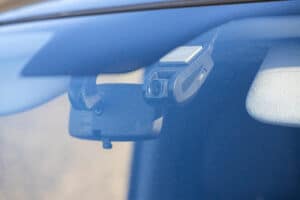Can I See the Dashcam Footage of My Arrest?
If you were arrested for a traffic violation, there is likely dashcam footage of the incident. Mobile Video Audio Recording Systems (MVARS), also known as dashcams, are not required by California law. However, a significant amount of California police departments use them in their patrol cars. Additionally, all California Highway Patrol cruisers have MVARS installed. Therefore, if there is a recording of your arrest, you can review the footage to see if it helps your case.
What Is a Dashcam?
Dashcams are installed on the front dashboard of a vehicle to record what is happening in the driver’s line of sight. When law enforcement uses MVARS, they typically mount the device in the middle of the dash, next to the driver.
The camera will typically record continuously, though some models are designed to turn on when the cruiser turns on its emergency lights and sirens. This indicates a pursuit is in progress and that actions may need recording. Officers are generally not allowed to turn off a dashcam.
Why Does Law Enforcement Use Dashcams?
California law enforcement agencies can use dashcams to boost transparency while also sometimes helping convict defendants of crimes.
For people accused of crimes on California’s roads and highways, dashcam footage can show that the police acted inappropriately. Also, knowing they are being recorded can provide an incentive for the police to act by the book. For example, an MVERS recording can show that officers took proper steps before arresting someone.
However, law enforcement also benefits from the dashcam and its footage. By providing a visual and audio record, MVERS avoids “he said – she said” scenarios where each side presents a different version of events. Additionally, dashcam footage is instrumental in DUI cases.
The footage will show the accused’s driving patterns, which can justify a suspicion of DUI. It will also record any field sobriety testing, providing visual support for the officer’s conclusions regarding the driver’s intoxication
How Can I Use the Dashcam Footage of My Arrest?
After you have been arrested, you could face charges that lead to a criminal trial. In preparation for that trial, your criminal defense attorney should seek to review any dashcam footage. Typically, if there is an MVERS recording of your arrest, your attorney will only need to ask for a copy of the video. Then, they can help you determine whether the evidence helps or hurts your case.
An MVERS tape can be beneficial if it shows you behaving normally. If your driving looks safe and within the rules of the road, the dashcam footage can call an officer’s justification for pulling you over into question.
However, dashcam footage can significantly hurt your arguments, especially in a DUI case. If the video shows your car swerving wildly between lanes, think how that will look to a judge or jury. Imagine you fell during your field sobriety test or could be heard slurring your speech on the audiotape. None of these scenarios will help you avoid conviction.
After an arrest in Westminster, California, you need an experienced criminal defense team to explain your options. Chambers Law Firm can help you secure footage of your arrest and determine appropriate next steps. Schedule a no-obligation consultation today by calling 714-760-4088 or emailing dchambers@clfca.com
.





